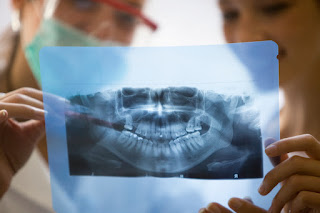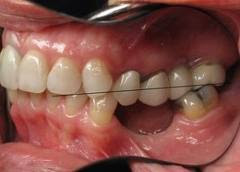Got questions about tooth whitening? Want to find out if you’re doing the best you can do to look after your teeth and gums? Your questions are all answered in this four-part FAQ guide to oral health and hygiene.
Welcome back to our four-part article series in which Teeth in a Day specialists in Chicago answer all your frequently asked questions on oral health and hygiene. In our previous article post, we discussed the various habits to avoid when brushing your teeth, why flossing is so important and what the signs and symptoms of gingivitis, or early gum disease are. In this article, the third installment of the series, we’ll shift our focus to address more of your health-related questions.

FAQ: How might I know if I have a cavity?
Answer: Unless you can actually see the little dark spot on your teeth, chances are you won’t know if you have a cavity. This is especially true if it’s only on the surface of your dental enamel. It’s only once the cavity deepens and reaches the pulp chamber that pain and sensitivity alert you to the fact that there’s something wrong. The best way to deal with cavities (and find out if you have one or more) is to go for regular scheduled appointments with the dentist.
FAQ: Is it really all that important to replace missing teeth if they don’t have much of an impact upon your appearance?
Answer: Yes, it is important! Many people feel that a missing tooth at the back of their mouth can be ignored because it doesn’t have much of an influence on their appearance. The importance of replacing missing teeth extends so much further than just a concern for aesthetics!
“Leaving a tooth without replacement with a sophisticated technology like dental implants leaves your mouth vulnerable to all sorts of problems,” explain All On Four dentures specialists in Chicago. “For one, the neighboring teeth become unstable and begin to shift to fill the gap left bare by the missing tooth. This instability then passes along the dental arch in a sort of domino effect.”
Leaving the tooth socket exposed also increases your risk of infection, since food and bacteria can readily become trapped in it. Also, it’s difficult to keep clean because it’s sensitive. Last but not least, the bone at the site of the missing tooth tends to become resorbed by the jaw, resulting in a loss of volume (see image below). This causes further problems for the neighboring teeth and can actually lead to further tooth loss!
FAQ: Why are dental implants recommended over conventional dental bridges?
Answer: Dental implants last twice or even three times as long as conventional dental bridges, they feel far more natural and don’t require the two healthy adjacent teeth to be filed down for support. Implants are also stronger, easier to clean and tend to minimize the risk of further infection, as opposed to bridges, which are associated with an increased risk of tooth decay and tooth loss.
Stay Tuned for Part 4
To read the answers to more Frequently Asked Questions about oral health, hygiene and cosmetics, stay tuned for the final installment of this four-part article series, courtesy of All On Four Denture specialists in Chicago.

No comments:
Post a Comment